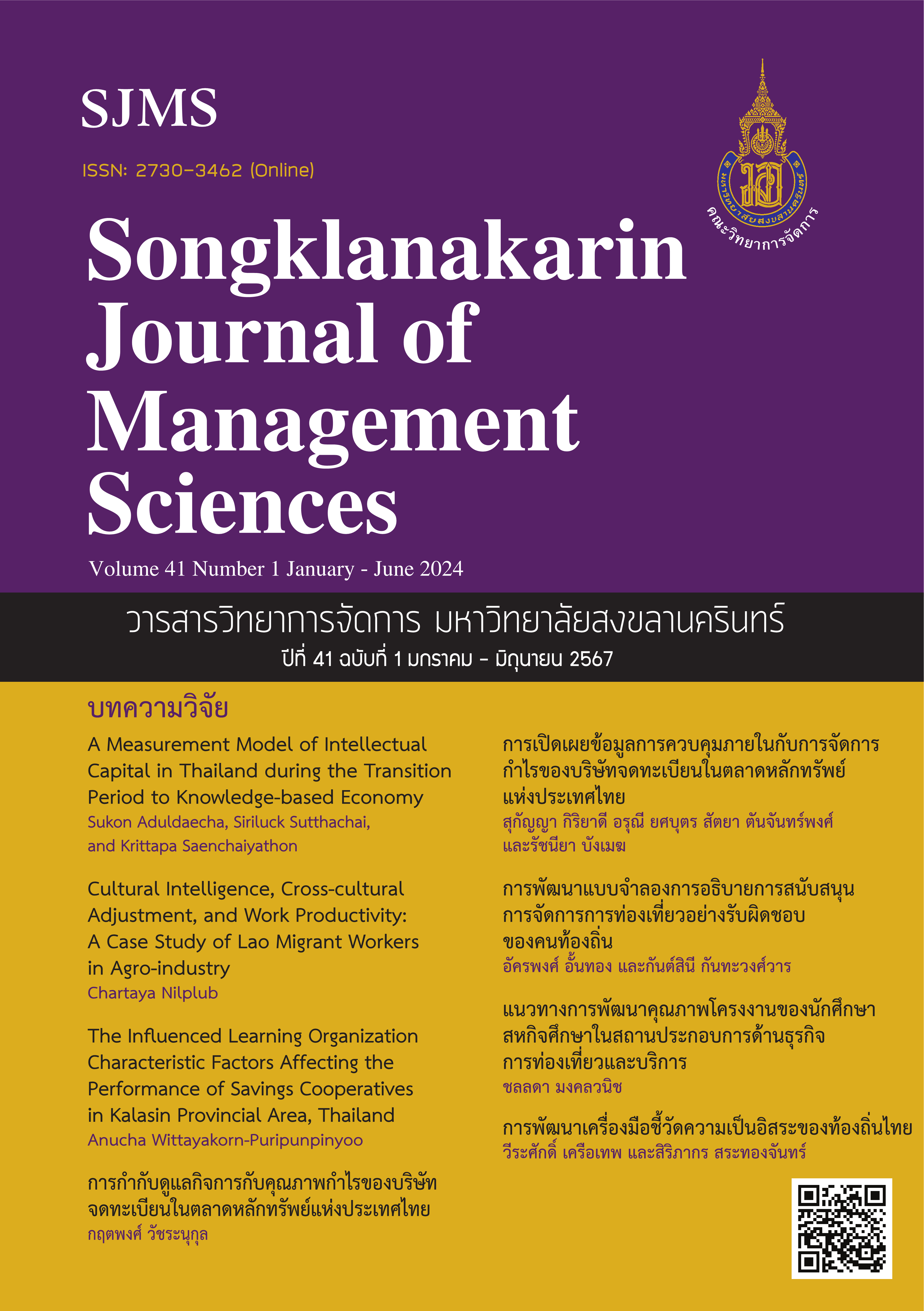The Development of a Model Explaining the Support for Responsible Tourism Management of Local Residents
Main Article Content
Abstract
This article aims to develop a model to better understand the factors influencing local residents' support for responsible tourism management. The model encompasses five latent variables and sixteen observational variables, and its analysis involved a structural equation model based on data collected from 200 local residents through questionnaires. The study's outcomes reveal a significant correlation between responsible tourism management and the enhancement of local people's satisfaction with quality of life. This discovery emphasizes the importance of fostering support for responsible tourism practices among local residents. Additionally, the study highlights the need for effective communication and information dissemination regarding responsible tourism guidelines within the community, especially concerning the preservation of local tourist attractions. Therefore, to encourage local people to participate and support responsible tourism management in the community, relevant sectors should regularly inform local people about responsible tourism management in the community. A forum should be set up to provide residents with an opportunity to actively engage in responsible tourism management. In addition to further encouraging community support, it is recommended to organize community-based tourism activities that not only showcase residents' empathy towards fellow citizens but also extend their warmth and care to visitors. This approach not only bolsters backing for responsible tourism in the community but also contributes to an overall increase in people's satisfaction with their quality of life.
Article Details

This work is licensed under a Creative Commons Attribution-NonCommercial-NoDerivatives 4.0 International License.
All published articles are SJMS’s copyright. The editorial board allows all published articles to be copied, excerpted, or disseminated with academic citation.
References
Camilleri, M. A. (2016). Responsible tourism that creates shared value among stakeholders. Tourism Planning Development, 13(2), 219-235.
Dotto, D. M. R., & Slongo, L. A. (2020). Responsible tourism - Divergences between the principles of sustainability and the actions of the tourism sector in Brazil. Journal of Tourism, Culture and Territorial Development, 11(21), 23-41.
Erul, E., & Woosnam, K. M. (2022). Explaining residents’ behavioral support for tourism through two theoretical frameworks. Journal of Travel Research, 61(2), 362-377.
Eslami, S., Khalifah, Z., Mardani, A., Streimikiene, D., & Han, H. (2019). Community attachment, tourism impacts, quality of life and residents’ support for sustainable tourism development. Journal of Travel & Tourism Marketing, 36(9), 1061-1079.
Font, X., & Lynes, J. (2018). Corporate social responsibility in tourism and hospitality. Journal of Sustainable Tourism, 26(7), 1027-1042.
Ganji, S. F. G., Johnson, L. W., & Sadeghian, S. (2021). The effect of place image and place attachment on residents’ perceived value and support for tourism development. Current Issues in Tourism, 24(9), 1304-1318.
Goodwin, H. (2016). Responsible Tourism: Using Tourism for Sustainable Development. Oxford: Goodfellow Publishers Limited.
Hair, J. F., Black, W. C., Babin, B. J., & Anderson, R. E. (2019). Multivariate Data Analysis. 8th ed. Hampshire: Cengage Learning EMEA.
Hanafiah, M. H., Azman, I., Jamaluddin, M. R., & Aminuddin, N. (2016). Responsible tourism practices and quality of life: Perspective of Langkawi Island communities. Procedia - Social and Behavioral Sciences, 222, 406-413.
Hu, L. T., & Bentler, P. M. (1999). Cutoff criteria for fit indexes in covariance structure analysis: Conventional criteria versus new alternatives. Structural Equation Modeling, 6(1), 1-55.
Jöreskog, K. G., & Sörbom, D. (1999). LISREL 8 User’s Reference Guide. Lincolnwood, IL: Scientific Software International, Inc.
Kline, R. B. (2011). Principles and Practice of Structural Equation Modeling. 3rd ed. New York: The Guilford Press.
Kumar, A., & Nandani, G. (2016). Responsible tourism: Awareness among host community. Quest-The Journal of UGC-HRDC, 10(3), 293-298.
Mathew, P. V., & Sreejesh, S. (2017). Impact of responsible tourism on destination sustainability and quality of life of community in tourism destinations. Journal of Hospitality and Tourism Management, 31, 83-89.
Muthén, L. K., & Muthén, B. O. (2012). Mplus User’s Guide. Seven Edition. Los Angeles, CA: Muthén & Muthén.
Nunkoo, R., & So, K. K. F. (2016). Residents’ support for tourism: Testing alternative structural model. Journal of Travel Research, 55(7), 847-861.
Soper, D. S. (2022). A-priori Sample Size Calculator for Structural Equation Models. Retrieved June, 7, 2022, from https://www.danielsoper.com/statcalc/calculator.aspx?id=89
Steiger, J. H. (2007). Understanding the limitations of global fit assessment in structural equation modeling. Personality and Individual Differences, 42(5), 893-898.
Stoffelen, A., Adiyia, B., Vanneste, D., & Kotze, N. (2020). Post- apartheid local sustainable development through tourism: An analysis of policy perceptions among ‘responsible’ tourism stakeholders around Pilanesberg National Park, South Africa. Journal of Sustainable Tourism, 28(3), 414-432.
Tabachnick, B. G., & Fidell, L. S. (2013). Using Multivariate Statistics. 6th ed. New York: Pearson.
Tournois, L., & Djeric, G. (2019). Evaluating urban residents’ attitudes towards tourism development in Belgrade (Serbia). Current Issues in Tourism, 22(14), 1670-1678.
Untong, A. (2022). An application of theory reasoned action to examine factors explaining residents’ support for community-based tourism. Srinakharinwirot Research and Development (Journal of Humanities and Social Sciences), 14(7), 193-205.
Vodeb, K., Fabjan, D., & Krstinić Nižić, M. (2021). Residents’ perceptions of tourism impacts and support for tourism development. Tourism and Hospitality Management, 27(1), 143-166.
Zagonari, F. (2019). Multi-criteria, cost-benefit, and life-cycle analyses for decision-making to support responsible, sustainable, and alternative tourism. Sustainability, 11(4), 1-35.
Zaman, U., Aktan, M., Agrusa, J., & Ghani Khwaja, M. (2022). Linking regenerative travel and residents’ support for tourism development in Kaua’I Island (Hawaii): Moderating-mediation effect of travel-shaming and foreign tourist attractiveness. Journal of Travel Research, 62(4), 782-801.
Zgolli, S., & Zaiem, I. (2018). The responsible behavior of tourist: The role of personnel factors and public power and effect on the choice of destination. Arab Economics and Business Journal, 13(2), 168-178.

